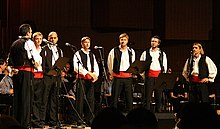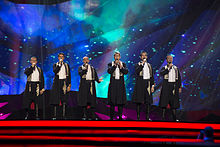The music of Croatia, like the divisions of the country itself, has two major influences: Central European, present in central and northern parts of the country including Slavonia, and Mediterranean, present in coastal regions of Dalmatia and Istria.
Georgia has rich and still vibrant traditional music, primarily known for arguably the earliest polyphonic tradition of the Christian world. Situated on the border of Europe and Asia, Georgia is also the home of a variety of urban singing styles with a mixture of native polyphony, Middle Eastern monophony and late European harmonic languages. Georgian performers are well represented in the world's leading opera troupes and concert stages.

A fest noz is a Breton traditional festival, with dancing in groups and live musicians playing acoustic instruments.

Posušje is a town and municipality in Bosnia and Herzegovina. It is located in the West Herzegovina Canton, a federal unit of the Federation of Bosnia and Herzegovina.

Oliver Dragojević was a Croatian singer and composer, who was considered one of the most enduring musical stars and cultural icons in Croatia with a discography that spanned nearly five decades. His style blended traditional klapa melodies of Dalmatia, a coastal region in his native Croatia, with jazz motifs wrapped up in a modern production.
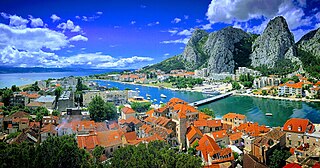
Omiš is a town and port in the Dalmatia region of Croatia, and a municipality in the Split-Dalmatia County. The town is approximately 25 kilometres south-east of Croatia's second largest city, Split, where the Cetina River meets the Adriatic Sea. Omiš municipality has a population of 14,936 and its area is 266 square kilometres (103 sq mi).

Kolintang is a traditional Minahasan percussion instrument from North Sulawesi, Indonesia, consisting of wooden blades arranged in a row and mounted on a wooden tub. Kolintang is usually played in ensemble music. Kolintang in the Minahasan community is used to accompany traditional ceremonies, dance, singing, and music. The wood used to make Kolintang blades is light but strong local wood such as Telur wood, Wenuang wood, Cempaka wood, Waru wood, and the like which have a fiber construction. parallel. Meanwhile, kolintang resonator crates are usually made of hardwood materials such as teak or mahogany.

Klapa Šufit is a musical group from Split, Croatia.
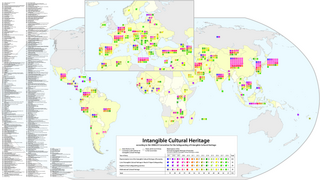
UNESCO established its Lists of Intangible Cultural Heritage with the aim of ensuring better protection of important intangible cultural heritages worldwide and the awareness of their significance. This list is published by the Intergovernmental Committee for the Safeguarding of Intangible Cultural Heritage, the members of which are elected by State Parties meeting in a General Assembly. Through a compendium of the different oral and intangible treasures of humankind worldwide, the programme aims to draw attention to the importance of safeguarding intangible heritage, which UNESCO has identified as an essential component and as a repository of cultural diversity and of creative expression.

Tenore di Bitti "Mialinu Pira" is an Italian ensemble formed in 1995, specialized in the Sardinian cantu a tenore. The Cantu a tenore is a style of polyphonic folk singing characteristic of the Barbagia region of the island, even though some other Sardinian sub-regions bear examples of such tradition. The cantu a tenore was proclaimed by the UNESCO "Masterpieces of the Oral and Intangible Heritage" in 2005.
Klapa Fa Linđo is a female klapa group from Dubrovnik, Croatia. The group was founded in 2000 as a part of the Folklore Ensemble Linđo. In 2002 they won the Golden Token Award at the Verona Festival of Choral Singing in Italy. In 2003 and 2004, the girls made the finals at the Festival of the Dalmatian Klapas in Omiš where they won the esteemed Audience Choice Award. They won audience award and the Golden Leut at Omiš in 2009.
Croatian dance traditionally refers to a category of folk-dances, the most common being the kolo.

Ojkanje is a tradition of polyphonic folk singing in Croatia characteristic for the regions of the Dalmatian hinterland, Velebit, Lika, Kordun, and Karlovac. As described in The Harvard Dictionary of Music: "The ojkanje is a particular style of singing melisma with a sharp and prolonged shaking of the voice on the syllables oj or hoj."
The Register of Cultural Goods of the Republic of Croatia has been established in 1999. The Croatian Ministry of Culture is responsible for the administration of this public register, which has been created according to the Act on the protection and preservation of cultural goods of 1999. The register is a comprehensive list of all cultural monuments under national protection.
Croatia participated in the Eurovision Song Contest 2013 with the song "Mižerja" written by Goran Topolovac. The song was performed by the group Klapa s Mora, which was selected internally by the Croatian broadcaster Croatian Radiotelevision (HRT) on 11 February 2013 to represent Croatia at the 2013 contest in Malmö, Sweden. Their song "Mižerja" was presented to the public on 27 February 2013 during a live streamed press conference.

Czech folklore is the folk tradition which has developed among the Czech people over a number of centuries. Czech folklore was influenced by a mix of Christian and pagan customs. Nowadays it is preserved and kept alive by various folklore ensembles uniting members of all ages, from children to seniors, showing their talent during competitions, folklore festivals or other performances.
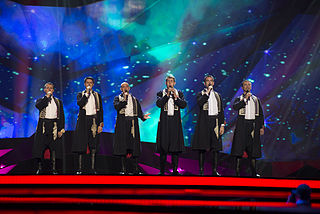
Klapa s Mora was a music ensemble that represented Croatia in the Eurovision Song Contest 2013 in Malmö with the song "Mižerja". It is a "super klapa" ensemble that includes six male klapa singers from five existing klapa groups in Croatia.

Festival dalmatinskih klapa Omiš is a music festival of klapa singing held annually in Omiš, Croatia. It has existed since 1966, and it is the most important klapa event.

Živko Ključe is a Croatian composer, double bass player and ethnomusicologist.
Joško Ćaleta is a Croatian ethnomusicologist, music pedagogue, conductor, composer, record producer and klapa singer.
